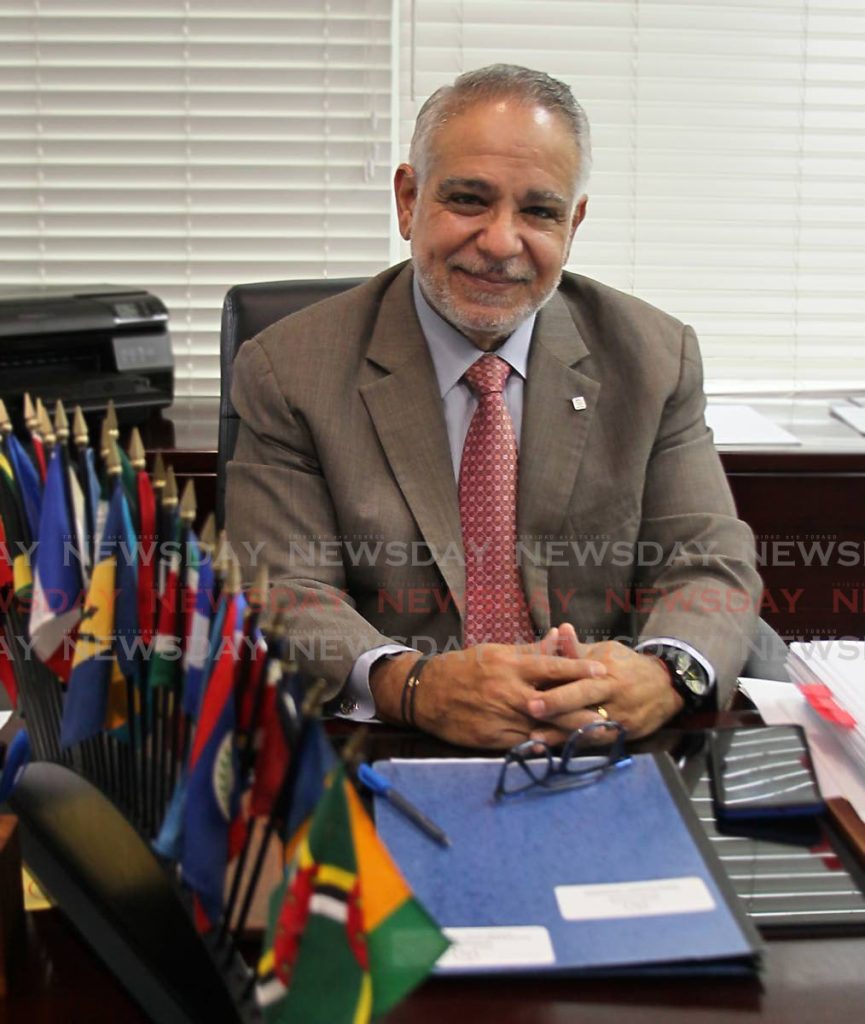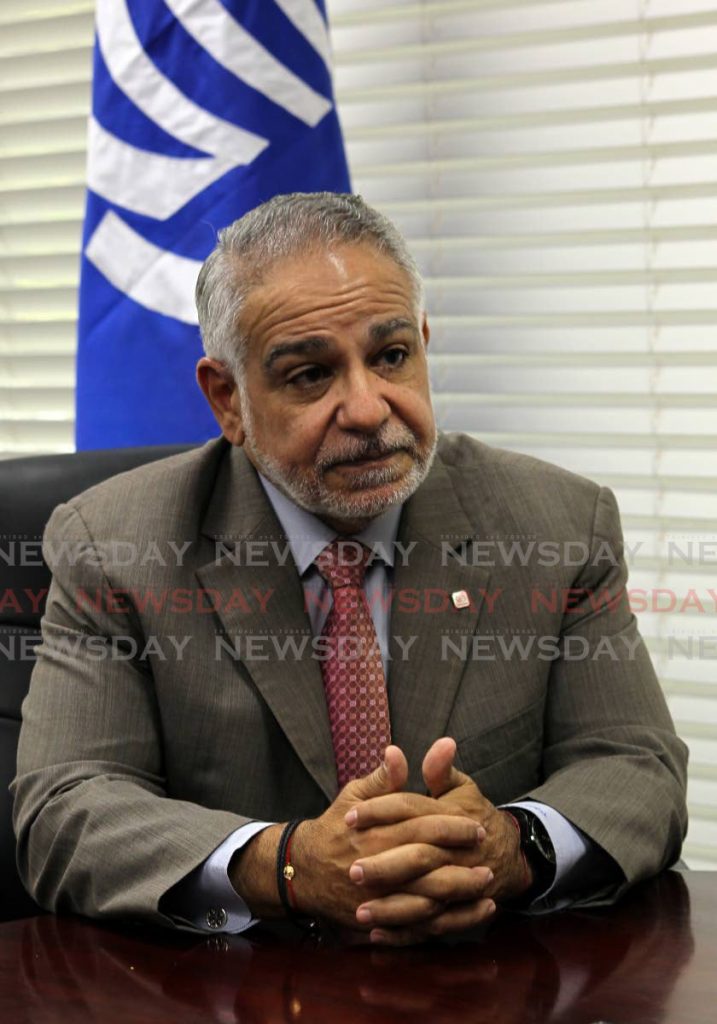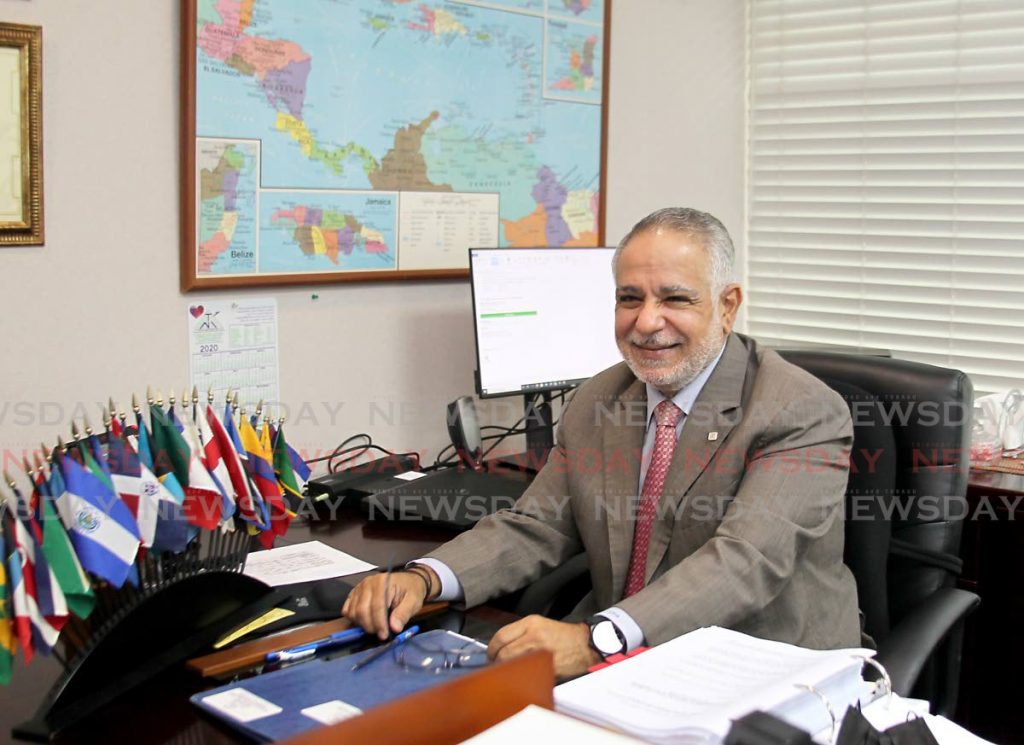Rodolfo Sabonage: Making the Caribbean connection

It has only been one month since the new general secretary of the Association of Caribbean States (ACS) took up office in Port of Spain, but he already has plans to significantly upgrade the convention of the organisation to fit the changing landscape.
Panamanian Rodolfo Sabonge officially began his role as the seventh general secretary in November after his 14-day quarantine as per covid19 entry policy into the country. His appointment came after St Lucian Dr June Soomer’s term ended earlier this year. She was the first and only woman to hold the post of general secretary, so far.
The ACS was formed in 1994 with the signing of its convention in Cartagena de Indias, Colombia. It aimed to provide a platform for dialogue for the 35-member and associate states which would allow dialogue in areas of common interests, concern, opportunities and solutions at a regional level.
Sunday Newsday sat down with Sabonge at his office on Sweet Briar Road, St Clair to find out what his plans were for his term which would end in 2024.
While he was thrilled to be in TT, he noted that covid19 has put a damper on the true experiences the island had to offer, which was well-known throughout the region and other parts of the world. He emphasised the need to be vigilant and careful with the virus because of the threats it posed, but this not being his first time in TT, he and his wife intended to maximise on the leisure experiences available to him within the confines of the health regulations.
He said, “I like the similarities with Panama regarding culture, hospitality, food, etc. I plan to visit historical and cultural places, experience Carnival, if possible, and other local festivals.”
He is not social media savvy and to get in contact with him would have to be done through the ACS office.
Mechanical engineer at heart
Sabonge's long professional career spans over 45 years and has allowed him to gain diverse knowledge and experience in areas such as international trade, transport, maritime and logistic development. A mechanical engineer at heart, with a master's degree in maritime development he has special interest in developing the region’s transportation hub.
Some of his previous portfolios included general manager of the Panama railroad and as a plant engineer who was responsible for the maintenance of the Panama Canal locks.
Sabonge also played an integral role in the transfer of the Panama Canal from the US to Panama in 1999 in accordance with the Torrijos-Carter Treaties. These treaties were ratified by both states in 1978 and both outlined eventual control of the Panama Canal to Panama, in which the US had initially acquired the rights to build and operate the oceanic transport hub.
Sabonge told Newsday that while the role of ACS facilitated consultation, cooperation and concerted actions for its members, he hoped to have a more inclusive organisation that was aligned with the changes of the 21st century.

He explained that the pillars outlined in the ACS Charter when it was first established in 1994 were still valid but needed to be reevaluated to function effectively with changes of its membership and the international landscape.
The pillars referred to were the preservation of the Caribbean Sea and natural resources, sustainable tourism, adaptation and mitigation of natural disasters, and an efficient transport system.
He said, “Those issues are still valid, but the ways to approach those issues have changed. The most important issue remains the Caribbean Sea because this is what unites us.
“All the countries have contact with the Caribbean Sea, so we are physically responsible for its management and because of climate change the Caribbean Sea has become more important.”
Sabonge explained that with globalisation and the dependence of interconnectedness, a major challenge for the region remained connectivity.
“Part of the problem is our geography. The countries are too dispersed and to be able to compete in this globalised world one must be able to connect.
“Physical and digital connectivity need to complement each other. There must be a maritime and logistics strategy. We need to look at where the trade is coming from, where is it going to and the best mode of transportation,” he noted.
Ferry sailings for the region
He said an efficient ferry service was one of the mechanisms to achieve this and because of the large geographical spread. The transportation hub, which should include air sea and land, should be broken-up into various stations to accommodate trade and the movement of people.
Sabonge said, “To get an initiative like that going we need to remove a lot of barriers such as trade, health, immigration and a lot of the processes that have blocked harmonisation in the region.
“Digitalisation is a major part of this transition. If we are able to have other countries within the same digital platform then we can start facilitating trade, people and cargo. Competitiveness will be improved because we will now be facilitating intra-trade and international trade.”
With this type of interconnectedness, protection of each sovereign states’ borders and people become grave concerns. Security issues in a region that was already plagued with numerous cases of drug, human and animal trafficking, just to name a few are issues governments continue to struggle to get a handle on.
Sabonge’s belief is that proper monitoring and control, by establishing good border controls at the transportation hubs, can be a mitigation mechanism in this fight.
“For security nowadays, it is not just having physical security but having intelligence. Developing the intelligence network, understanding risk and how to manage it should be taken into account,” he posits.
Shipping plan for covid19 vaccines
He emphasised the need for the transportation hub as covid19 vaccines become available in order to facilitate storage and transportation for the smaller islands who would be placed in a disadvantaged position.
He said, “How do we transport the vaccines, store it and distribute it and make it effective? Those are some of the issues that affect us. Always smaller countries are disadvantaged because of economies of scale, lack of infrastructure.
“One of the things the ACS can provide is one voice. Everybody has the same vote, when you sit at the table it does not matter the size of your population or gross domestic product (GDP). So, when we are looking at solutions, we can bring technical expertise that everybody can benefit from.”
Sabonge stressed on the risks to all small island developing states (SIDS) – from education, to health, to the environment, to trade, and the economy.
He noted for example the implications of climate change which should be of major concern to SIDS, especially in this region which depends so much on tourism for their main source of revenue.

“Climate change has evolved in the last 25 years as there has been increases in rain, floods and other natural phenomena,” he said.
Additional funding, he admitted was needed to assist with mitigation and rehabilitation in times of natural disasters, but this was often short coming and planned to propose a special fund for this purpose.
There are many initiatives that the secretariat would like to bring forward, but Sabonge said it all relied on the cooperation of governments within the ACS to get the ball rolling.
With an organisational restructuring of the ACS last year more emphasis was placed on resources and mobilisation efforts.
Sabonge said, “With this new structure we can bring more donors and funds to finance projects and programmes. That was one of the objectives of the reorganisation – to create a directorate just for that.”
The covid19 pandemic, he noted has posed many challenges, but he was not able to disclose any of the recovery plans yet until the ACS states agreed on proposed initiatives.
“Traditional funding for this type of organisation has changed, so now we have to look for alternatives,” Sabonge pointed out.
Diversification still key to survival
At the recently concluded Caricom-Cuba summit, participating members agreed to continue receiving covid19 assistance from Cuba and to also work towards covid19 management and the possible application of innovative Cuban biotech medicines, as epidemiological conditions in the region showed a common trend. This type of cooperation and inclusivity was welcomed by Sabonge.
And while manoeuvring covid19 was important for all nation-states, Sabonge said the pandemic has shown the importance of diversification and investments in areas taken for granted.
He said, “We need to diversify our economies. What covid19 showed was that food security was most important and if you do not have it and accustomed to importing it, then you see it was not easy.
“It also showed that instead of bring things from far away, you can now look to your neighbours. This has taught us to look at regional supply and demand of not only food, but every other product.”
Sabonge urged for cultural barriers to be broken because the Latin America and the Caribbean had many similarities. Rather than looking at the differences, he said, the similarities offered much more positive opportunities.
“Diversity is not bad; it increases the value of a culture. Many of the small islands have a French, Spanish or English background and you need to look at all of them as one.”
ACS members
Antigua & Barbuda
Bahamas
Barbados
Belize
Colombia
Costa Rica
Cuba
Dominica
Dominican Republic
El Salvador
Grenada
Guatemala
Guyana
Haiti
Honduras
Jamaica
Mexico
Nicaragua
Panama
Saint Kitts & Nevis
Saint Lucia
Saint Vincent & the Grenadines
Suriname
Trinidad & Tobago (Secretariat)
Venezuela
Associate Members
Aruba
Bonaire (The Netherlands)
British Virgin Islands
Curaçao
French Guiana (France)
Guadeloupe
Martinique
Saba (The Netherlands)
Saint Barthelemy (France)
Saint Martin
Sint Eustatius (The Netherlands)
Sint Maarten


Comments
"Rodolfo Sabonage: Making the Caribbean connection"